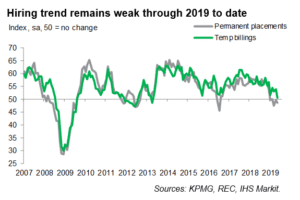With the country electing a new government and the new parliament voting by 124 votes in favour of the EU Withdrawal agreement Brexit is almost done and business and the country can start to move forward. Well that’s the theory and really only time will tell but with a majority of 80 MPs we will have a degree of certainty as we all plan for 2020 and a new decade.
So where does that leave us in the recruitment sector?
Well we predicted seven years ago in our hugely popular blog Top 5 Recruitment Sectors to be in for the next 5-10 years the five key sectors for growth and as we start the new decade our views have not changed too much:
- Information Technology
- Engineering
- Energy, Oil and Gas
- Healthcare
- Emerging Technology application
And as we move forward to the economy being a bit more positive in the next twelve months it’s time to look forward to our predictions for next year.
UK & Global Economy
As we reported last year the UK economy has been remarkably resilient over the past eighteen months but there was a sense in the last few months of 2019 that we were in serious danger of entering a recession.
Last year we had predicted GDP growth of 1.2% until Brexit happened with 1.6-1.9% afterwards. As Brexit never happened 1.2% became the reality (as predicted by PWC) but we are hopeful in 2020 that it will rise to the 1.6-1.9% we predicted last year.
Companies have been holding off investment till the medium term becomes more certain and we believe that the post-elect and Brexit conditions we are moving into fulfil that criteria.
In addition, we have a UK Govt that has committed to significant investment in the UK economy:
- £100bn committed to Infrastructure projects over the next five years
- An extra £33.9bn on the NHS by 2023/24.
- UK’s 2050 Carbon Neutral Commitment
- New expenditure in Education and schools/colleges
This coupled with the huge levels of external investment that we hear has been waiting to be invested in capital and property development in the UK we anticipate a significant positive effect on aggregate demand for staff in the UK.
It’s our experience that candidates have been holding off switching careers in significant numbers over the past 6-12 months. This is typical of previous periods of uncertainty in the late 80s/90s as well as after 911 and also the financial crisis of 2008/9.

Published in June 2019 this timeline shows the dramatic candidate market change that occurred between 2008/9 and 2010/11.
It does not show the continued downward trend in candidate placements that we believe has occurred over the past six months.
Over the next two months don’t be surprised if you start to see surveys that indicate a significant percentage of candidates looking to change jobs in 2020 as this is what we anticipate. In past times this has been as high as 65-75% of staff seeking new careers. All of this is good for recruiters.
Finally, the Global economy has received some good news over the past few weeks with the early signs that the US & China are finally reaching a trade agreement that will remove the tariffs that have dampened international trade and subdued markets. This too can only help support the upturn in the UK economy.
In conclusion we believe 2020 will be a good year for the UK recruitment market
The Top 5 Sector outsiders for 2020
We remain a little certain as to how this will dynamic cocktail of political and market forces will play out over Q1/Q2 and so have ranked the following sectors just outside the top five.
Financial Services
The uncertainty of how the final trade agreement between the UK and the EU will shape up will have such a significant impact on this sector so we are not comfortable in forecasting significant return to growth in this sector until at least Q3 – 2020 when hopefully an agreement can be agreed but truth is we do not expect this sector to return to normality until Q1/Q2 – 2021 assuming a UK/EU trade agreement. If that is the case 2021 could be a. great year for Financial Services.
Distribution and Logistics
As this is coming from a strong performance in 2019 again the uncertainty and lack of clarity means we do not see this as being a sector for significant strong growth in 2020. There is still a lack of warehouse capacity in Q4/19 and Q1/20 due to Christmas and Brexit Stockpiling. As this unfolds in Q1/Q2 2020 we expect this sector to return to a degree of normality but with the long-term trend towards internet more shopping there is still growth in this sector. With expected UK government investment in AI and R&D we see the medium term less certain as this sector is ripe for automation.
Public Sector (Excl. Healthcare)
Additional government expenditure in education and the emergency services announced in the Queens speech and the relaxing of the fiscal constraints that have held back investment means we do expect there to be more monies in the public services over the next twelve months though IR35 will hamper temp/contractor growth in this sector and which will lead to further skill-shortages across the sector.
The Top 5 Sectors for Growth in 2020
No.5 – Energy (incl. Renewables)
The Energy sector seems set for strong growth again in 2020 due to the stable oil price currently more than $10 a barrel above the magic $50 at which investment seems to dwindle. In addition, the key area of growth in this sector is in renewables for reasons we have stated last year in our Top 5 predictions for 2019.
The UK has committed to being carbon neutral by 2050 which means we must continue to invest in Renewable Energy generation and technology. In addition, the EU continues to be committed to carbon reduction targets for 2020 and 2030 which means the continental demand for skills will also not subside despite some of their weaker economic indicators.
In Oct 2019 for the first time in our history electricity from renewable sources rose to 40% of the total generated surpassing fossil fuels for the first time since 1882 since the first fossil fuel plant powered up. 10 years ago, fossil fuels made up 80% of our electricity so this is huge step in our nations quest for carbon neutrality.
Luke Clark, of Renewable UK, told the Guardian recently that the industry hopes to treble the size of its offshore wind sector by 2030 to generate more than a third of the UK’s electricity.
The key statistic for recruiters which is driving demand for staff in this sector is that 566,000 people work in the sector which will need over 221,000 new recruits to fill its expected skills gap by 2027.
This represents a huge skills-gap which creates massive opportunity for recruiters in this sector.
No.4 – Healthcare
With the new government committed to spending and extra £33.9bn on the NHS by 2023/24 and the commitment to recruit 31,500 new nurses and an extra 5,000 GPs, creates another huge opportunity for our recruitment agency sector.
Given that the government are hoping to attract a significant number of these from abroad this creates an excellent opening for innovative and creative entrepreneurial recruitment agencies to support the national cause and help find these people.
We would be even more positive about this sector but the recent IR35 rule changes has made this sector less attractive and in fact we are hearing of UK recruitment firms supporting UK trained nurses and doctors making the move abroad to Canada, Australia and the. US.
No.3 – Engineering
Once again, the new government has committed to extra spending. This time £100bn on infrastructure projects over the next five years. Excluding those in construction, the projects listed so far include:
- Full-fibre Broadband
- Northern Powerhouse
- Battery Gigafactory
- National Plug-in Network for Electric Cars
- Rail and road upgrades
- HS2, (under review)
- HS3 potentially
In addition, there is also the third runway at Heathrow, completion of Cross rail, as well as Hinckley and Wylva nuclear power stations that need finishing plus significant rail construction projects.
In addition to this the demographics of the UK engineering market mean that there are a large number of engineers seeking to retire over the next 5-10 years. Annually we need an estimated 203,000 new engineers a year but according to the Institute of Engineering and Technology there is a shortfall of 59,000 graduate engineers in the UK.
Their recent 2019 Skills and Demand in Industry report published in November 2019 is essential reading for Engineering recruiters that are serious about advising and consulting with their clients.
The report indicated that 53% firms are concerned that a shortage of engineers in the UK is a threat to their business.
The report also highlights that nearly half of companies (48%) report difficulties in respect of the skills available in the external labour market when trying to recruit, with only 20% expecting the supply of engineering and technical skills into industry to improve over the next 3-5 years.
This represents a huge opportunity for genuine consulting recruitment agencies to work as trusted partners with your engineering clients to help solve these challenges and build long term and sustainable relationships.
No.2 – Information Technology and Technology
Technology and IT will be the dominant sector for the foreseeable future due to the Industrial Revolution 4.0.
Moore’s Law which states that computing power doubles every 18 months or so and has been the big driver in the past fifty years. To illustrate this the number of transistors which fit into a microprocessor reached over 10 billion in 2017. It was under 10,000 in 1971. (Source: Our world in data).
This rate of growth is slowing but technology is still advancing at a phenomenal rate due to the overall impact of computing power on other sectors. With quantum computers now arriving computing power is set to surge again.
Data however is now becoming the new power force that will drive us on to even greater productivity gains. 90% of the data in the world has been created in the past two years, a stat continues to be true year on year. (Source: Forbes magazine).
You will not be surprised to know that in a recent survey by the Royal Society they discovered of the 9.2million job adverts posted in the UK in a twelve month period 10% required data expertise.
So you will not be surprised to learn that Europe needs more 346,000 data scientists. IBM believe that data science will account for 28% of all digital jobs by next year and that these roles stay vacant for 45 days due to the lack of available talent.
“Machine learning, big data and data science skills are the most challenging to recruit for, and can potentially create the greatest disruption if not filled,” according to IBM’s The Quant Crunch report.
For recruiters this represents another huge opportunity to specialise in an expanding market which sees no end to the demand for the foreseeable future.
The other market for which demand appears insatiable is Cyber Security. According to ISC2 in their Cybersecurity Workforce study the global IT Skill shortage exceeds 4million. and in Europe it is 291,000.
Globally there are an estimated 2.93million Cybersecurity professionals including 289,000 in the UK and 805,000 in the US.
The importance of Cybersecurity was brought home to me this year when I was invited to speak on a platform of CIOs at Cisco Live in Barcelona on the Future of Work as well as publishing a blog: Future workforce demands paradigm shift in Talent Management.
One of the speakers shared with us the statistic that the Global Cisco receive 1.2 trillion security events each day, 7.6 billion DNS requests and 47TB of internet traffic inspected. Whilst these are colossal numbers, I am delighted that Cisco employ a highly sophisticated team backed by the latest AI to protect themselves and us from these attacks.
The scale of these skills gaps in the UK and globally once again provide a huge opportunity for UK recruiters.
Finally if you are keen to learn more about the top 10 technical skills in demand for 2020 then CNBC recently published their Top 10 which includes; Python, React (web), Angular, Machine Learning, Docker, Django, CompTIA, Amazon AWS, Deep Learning and React Native (mobile).
No.1 – Construction
For 2020 I am tipping the UK construction sector to be the fastest growing sector of the UK. My reason and logic are simple. In Q3 (and I believe Q4 will be similar) there has been a slowdown in construction sector output.
Recent ONS figure point to a 0.3% contraction in the third quarter but a 2.3% decrease in October alone. Working with several recruitment clients across this sector and in discussion with agency funders and construction material providers it is clear that Q4 has continued the downward trend. The REC/KPMG Jobs report published in December quoted demand for construction staff as showing a “marked fall in demand for temp staff.”
The reasons for this was political and economic uncertainty caused by the delays over Brexit, the general election and a lack of inward investment couple with a reluctance of developers to commence projects.
The great news is this uncertainty is over. Whatever your personal political views what is clear is that we have now clarity on Brexit and a stable government so the noises are positive. Already I am hearing of significant increases in demand for both construction staff and materials orders for January 2020. It is highly likely that we will see a shortage of roofing materials and bricks again as we approach the middle of 2020 so expect builders to start work early.
In addition to the release of this pent-up demand the new UK Government has committed to spending huge amounts of money on construction infrastructure some of which will be in £100bn we mentioned earlier under engineering. In addition to construction projects already mentioned the government has committed to building 1million new homes over the next five years. So far in 2018/19 240,000 houses have been built. This is the highest figure for over 30 years and shows the government’s commitment to solve the housing crisis that has blighted the UK for over a decade now.
Whilst there remain issues over green-belt usage with an 80 MP majority the government should have the political resolve to tackle this.
In 2020 we expect the demand for construction staff to rise rapidly from Q1 to Q2. With Brexit and the return of many foreign workers back to continental Europe there is going to be a critical skills shortage. According to the ONS 8% of the UK Construction workforce of 3m are from the EU. This will put undoubted pressure on rates and see many construction firms struggling to complete projects.
The final factor which is affecting the demand for staff is the rapidly ageing construction workforce. Over 20% of tradespeople are over 50 with 15% over 60. This is quite a worry as we embark on a decade of growth and infrastructure expansion.
There is more good news for Construction recruiters as wage growth between 2018-19 rose 8.5% well above the national average due to demand for staff and skill shortages.
We expect the following to be the most critical skill shortages:
- Brick Layers
- Electricians
- Scaffolders
- Tele-Handlers, 360 and dumper drivers
- Quantity Surveyors
- Site Managers
- Ground Workers
Our advice to all our construction agency clients is secure your workers as in 2020 those that have the workers will be the winners in this battle for skilled labour.
IR35 The Curved Ball
We are delighted to hear that the new government has promised to review the intended changes to the way the HMRC operate IR35 that are proposed to take effect in April. At a time when the government is seeking to inject some growth into the economy and launch a programme of capital expenditure and infrastructure upgrade we need as many of the professional engineering, technology and construction skills Britain is famed for. With the huge global skills gaps outlined already it would be potential suicide to give impetus to the growing trend of our workers to travel abroad.
Already there are large recruitment initiatives being launched by Middle East construction firms to raid the UK for skills. Many of the US and Canadian firms are eyeing the opportunities to temp our workers to North America and let’s not delude ourselves our EU partners also see the rich picking that can be made from poaching our skilled workforce.
The IR35 effect on our predictions could hugely impact our forecasts should the UK government carry on with the implementation though with the Construction Industry Scheme (CIS) this should see many workers staying here but our Engineering, IT and Energy workers will be tempted to leave our shores for the 30-50% premiums they will be able to make even after expenses from working outside the UK.
2020 Outlook
We are extremely positive for 2020 and look forward to further reflections as the year progresses. We would however be delighted to hear your thoughts too.
Recruitment Growth Surgery
Simplicity and the Recruitment Growth Network have teamed up with Ian Knowlson to deliver our EXCLUSIVE Recruitment Growth Surgeries. Each surgery consists of a 30 minute video cast presented by Ian, covering subjects that represent opportunities and threats to Growth in the recruitment industry.
Our next surgery will cover Sectors for growth in 2020 and Ian would like to answer your questions on this subject.
Register FREE today!
CLICK HERE to Register for the Recruitment Growth Surgery and send Ian your questions
For more information please visit Selling Success or contact Ian Knowlson on 0370 879 0105 or email info@sellingsuccess.co.uk
Copyright Selling Success 2019



